Academic Skills Module: Timetable, Reflection, Integrity, and Sources
VerifiedAdded on 2023/01/03
|14
|4410
|2
Homework Assignment
AI Summary
This assignment, completed as part of a Developing Academic Skills module, covers key aspects of academic success. It begins with a detailed personal timetable for module completion, outlining time management techniques to enhance productivity and meet deadlines effectively. The assignment offers advice for fellow students, emphasizing the importance of analytical skills, utilizing credible research databases, and prioritizing tasks. A reflective diary documents the student's experiences, challenges, and growth throughout the module, highlighting the development of time management and analytical skills. The assignment also includes an annotated bibliography of relevant sources, demonstrating the student's research capabilities. Furthermore, the assignment addresses academic integrity, including strategies to avoid plagiarism and proper Harvard referencing. The assignment also summarizes information sources using the CAARP framework. Overall, the assignment provides a comprehensive overview of academic skills, offering practical insights and strategies for students to improve their academic performance.
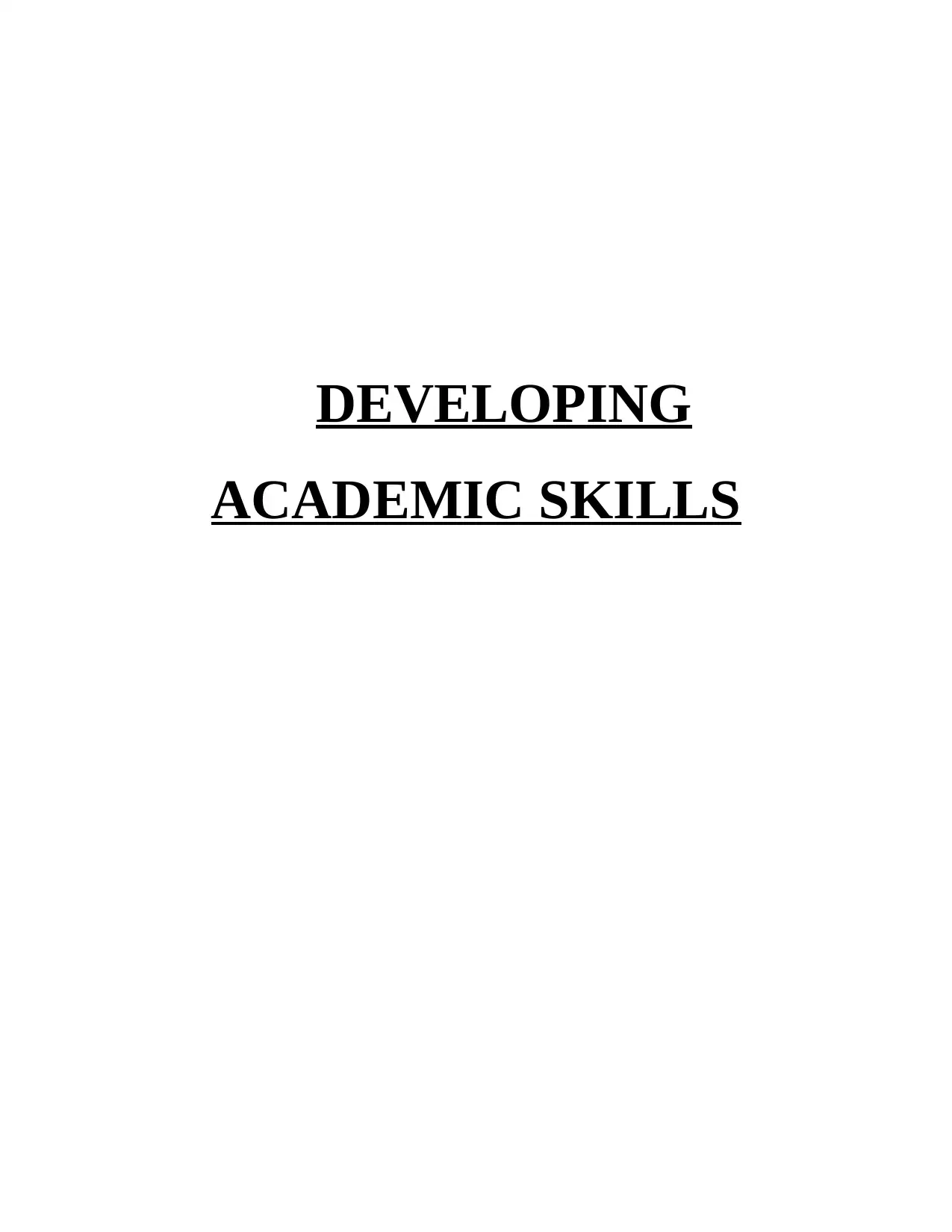
DEVELOPING
ACADEMIC SKILLS
ACADEMIC SKILLS
Paraphrase This Document
Need a fresh take? Get an instant paraphrase of this document with our AI Paraphraser
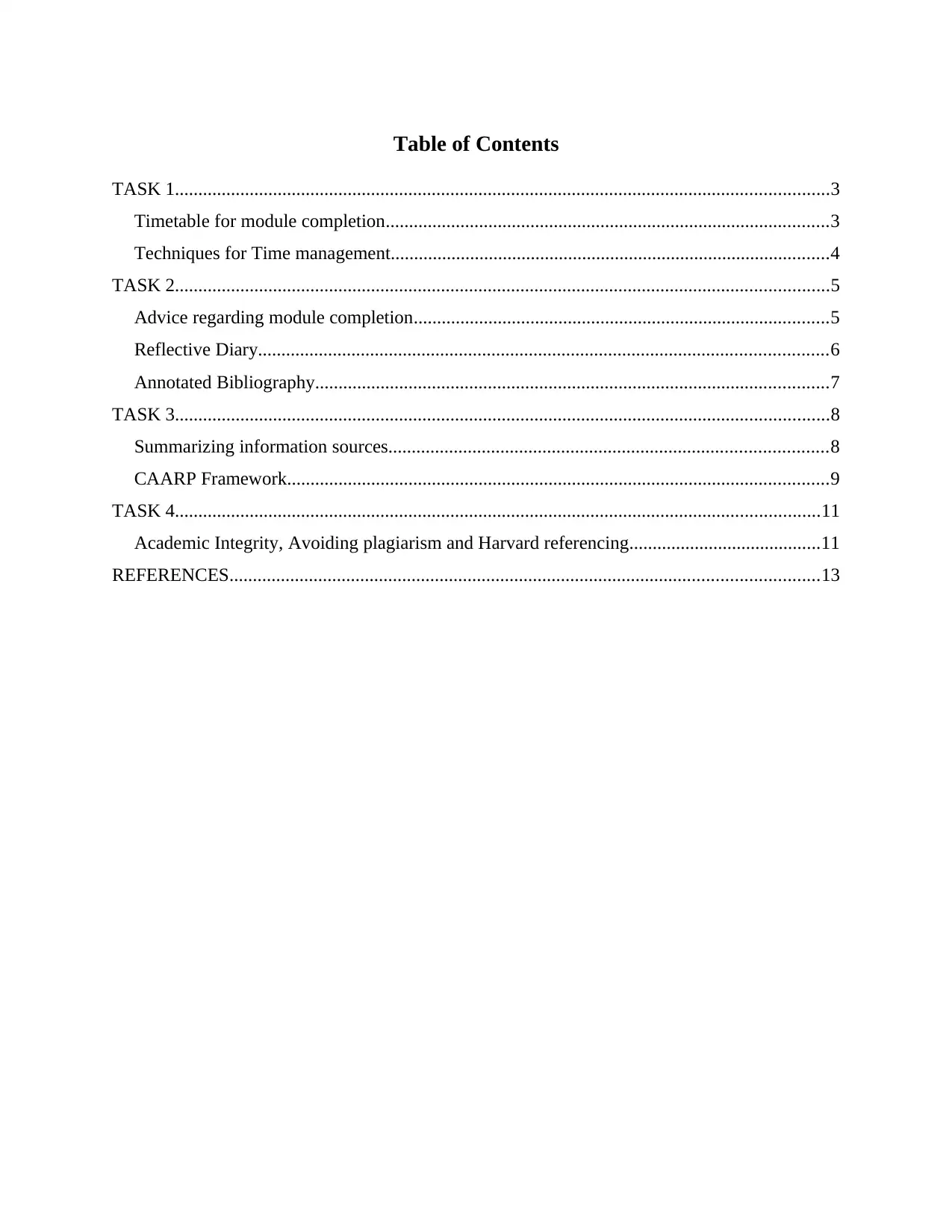
Table of Contents
TASK 1............................................................................................................................................3
Timetable for module completion...............................................................................................3
Techniques for Time management..............................................................................................4
TASK 2............................................................................................................................................5
Advice regarding module completion.........................................................................................5
Reflective Diary..........................................................................................................................6
Annotated Bibliography..............................................................................................................7
TASK 3............................................................................................................................................8
Summarizing information sources..............................................................................................8
CAARP Framework....................................................................................................................9
TASK 4..........................................................................................................................................11
Academic Integrity, Avoiding plagiarism and Harvard referencing.........................................11
REFERENCES..............................................................................................................................13
TASK 1............................................................................................................................................3
Timetable for module completion...............................................................................................3
Techniques for Time management..............................................................................................4
TASK 2............................................................................................................................................5
Advice regarding module completion.........................................................................................5
Reflective Diary..........................................................................................................................6
Annotated Bibliography..............................................................................................................7
TASK 3............................................................................................................................................8
Summarizing information sources..............................................................................................8
CAARP Framework....................................................................................................................9
TASK 4..........................................................................................................................................11
Academic Integrity, Avoiding plagiarism and Harvard referencing.........................................11
REFERENCES..............................................................................................................................13
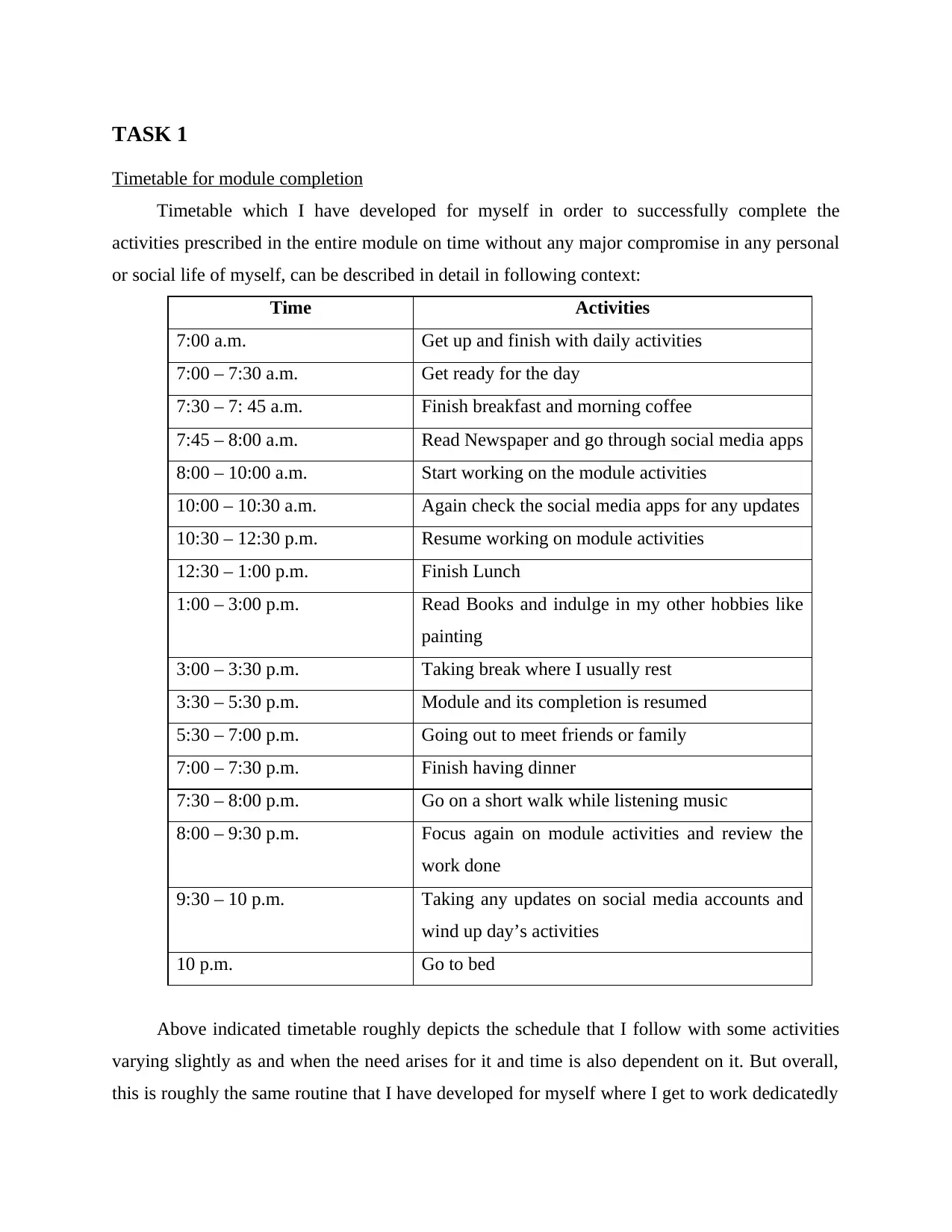
TASK 1
Timetable for module completion
Timetable which I have developed for myself in order to successfully complete the
activities prescribed in the entire module on time without any major compromise in any personal
or social life of myself, can be described in detail in following context:
Time Activities
7:00 a.m. Get up and finish with daily activities
7:00 – 7:30 a.m. Get ready for the day
7:30 – 7: 45 a.m. Finish breakfast and morning coffee
7:45 – 8:00 a.m. Read Newspaper and go through social media apps
8:00 – 10:00 a.m. Start working on the module activities
10:00 – 10:30 a.m. Again check the social media apps for any updates
10:30 – 12:30 p.m. Resume working on module activities
12:30 – 1:00 p.m. Finish Lunch
1:00 – 3:00 p.m. Read Books and indulge in my other hobbies like
painting
3:00 – 3:30 p.m. Taking break where I usually rest
3:30 – 5:30 p.m. Module and its completion is resumed
5:30 – 7:00 p.m. Going out to meet friends or family
7:00 – 7:30 p.m. Finish having dinner
7:30 – 8:00 p.m. Go on a short walk while listening music
8:00 – 9:30 p.m. Focus again on module activities and review the
work done
9:30 – 10 p.m. Taking any updates on social media accounts and
wind up day’s activities
10 p.m. Go to bed
Above indicated timetable roughly depicts the schedule that I follow with some activities
varying slightly as and when the need arises for it and time is also dependent on it. But overall,
this is roughly the same routine that I have developed for myself where I get to work dedicatedly
Timetable for module completion
Timetable which I have developed for myself in order to successfully complete the
activities prescribed in the entire module on time without any major compromise in any personal
or social life of myself, can be described in detail in following context:
Time Activities
7:00 a.m. Get up and finish with daily activities
7:00 – 7:30 a.m. Get ready for the day
7:30 – 7: 45 a.m. Finish breakfast and morning coffee
7:45 – 8:00 a.m. Read Newspaper and go through social media apps
8:00 – 10:00 a.m. Start working on the module activities
10:00 – 10:30 a.m. Again check the social media apps for any updates
10:30 – 12:30 p.m. Resume working on module activities
12:30 – 1:00 p.m. Finish Lunch
1:00 – 3:00 p.m. Read Books and indulge in my other hobbies like
painting
3:00 – 3:30 p.m. Taking break where I usually rest
3:30 – 5:30 p.m. Module and its completion is resumed
5:30 – 7:00 p.m. Going out to meet friends or family
7:00 – 7:30 p.m. Finish having dinner
7:30 – 8:00 p.m. Go on a short walk while listening music
8:00 – 9:30 p.m. Focus again on module activities and review the
work done
9:30 – 10 p.m. Taking any updates on social media accounts and
wind up day’s activities
10 p.m. Go to bed
Above indicated timetable roughly depicts the schedule that I follow with some activities
varying slightly as and when the need arises for it and time is also dependent on it. But overall,
this is roughly the same routine that I have developed for myself where I get to work dedicatedly
⊘ This is a preview!⊘
Do you want full access?
Subscribe today to unlock all pages.

Trusted by 1+ million students worldwide
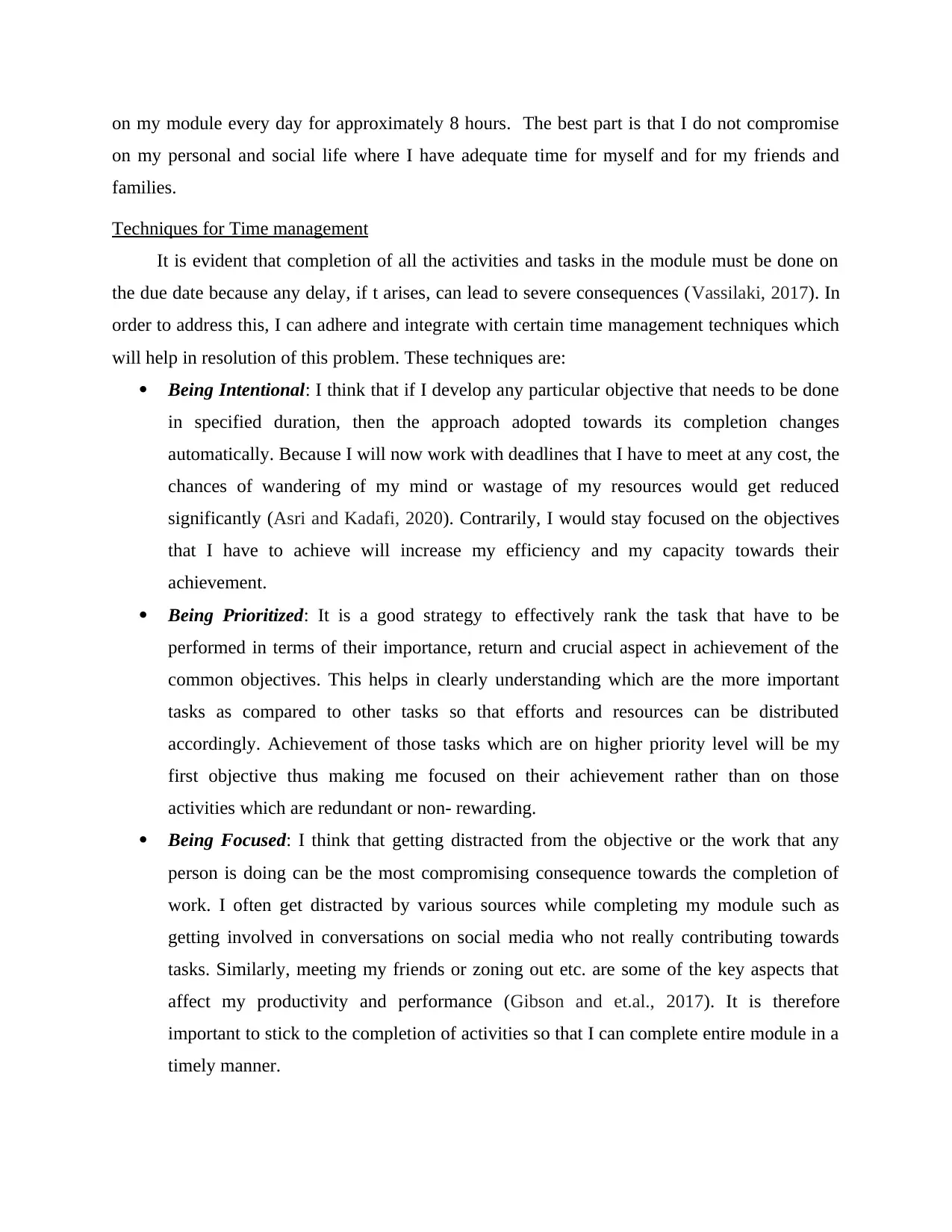
on my module every day for approximately 8 hours. The best part is that I do not compromise
on my personal and social life where I have adequate time for myself and for my friends and
families.
Techniques for Time management
It is evident that completion of all the activities and tasks in the module must be done on
the due date because any delay, if t arises, can lead to severe consequences (Vassilaki, 2017). In
order to address this, I can adhere and integrate with certain time management techniques which
will help in resolution of this problem. These techniques are:
Being Intentional: I think that if I develop any particular objective that needs to be done
in specified duration, then the approach adopted towards its completion changes
automatically. Because I will now work with deadlines that I have to meet at any cost, the
chances of wandering of my mind or wastage of my resources would get reduced
significantly (Asri and Kadafi, 2020). Contrarily, I would stay focused on the objectives
that I have to achieve will increase my efficiency and my capacity towards their
achievement.
Being Prioritized: It is a good strategy to effectively rank the task that have to be
performed in terms of their importance, return and crucial aspect in achievement of the
common objectives. This helps in clearly understanding which are the more important
tasks as compared to other tasks so that efforts and resources can be distributed
accordingly. Achievement of those tasks which are on higher priority level will be my
first objective thus making me focused on their achievement rather than on those
activities which are redundant or non- rewarding.
Being Focused: I think that getting distracted from the objective or the work that any
person is doing can be the most compromising consequence towards the completion of
work. I often get distracted by various sources while completing my module such as
getting involved in conversations on social media who not really contributing towards
tasks. Similarly, meeting my friends or zoning out etc. are some of the key aspects that
affect my productivity and performance (Gibson and et.al., 2017). It is therefore
important to stick to the completion of activities so that I can complete entire module in a
timely manner.
on my personal and social life where I have adequate time for myself and for my friends and
families.
Techniques for Time management
It is evident that completion of all the activities and tasks in the module must be done on
the due date because any delay, if t arises, can lead to severe consequences (Vassilaki, 2017). In
order to address this, I can adhere and integrate with certain time management techniques which
will help in resolution of this problem. These techniques are:
Being Intentional: I think that if I develop any particular objective that needs to be done
in specified duration, then the approach adopted towards its completion changes
automatically. Because I will now work with deadlines that I have to meet at any cost, the
chances of wandering of my mind or wastage of my resources would get reduced
significantly (Asri and Kadafi, 2020). Contrarily, I would stay focused on the objectives
that I have to achieve will increase my efficiency and my capacity towards their
achievement.
Being Prioritized: It is a good strategy to effectively rank the task that have to be
performed in terms of their importance, return and crucial aspect in achievement of the
common objectives. This helps in clearly understanding which are the more important
tasks as compared to other tasks so that efforts and resources can be distributed
accordingly. Achievement of those tasks which are on higher priority level will be my
first objective thus making me focused on their achievement rather than on those
activities which are redundant or non- rewarding.
Being Focused: I think that getting distracted from the objective or the work that any
person is doing can be the most compromising consequence towards the completion of
work. I often get distracted by various sources while completing my module such as
getting involved in conversations on social media who not really contributing towards
tasks. Similarly, meeting my friends or zoning out etc. are some of the key aspects that
affect my productivity and performance (Gibson and et.al., 2017). It is therefore
important to stick to the completion of activities so that I can complete entire module in a
timely manner.
Paraphrase This Document
Need a fresh take? Get an instant paraphrase of this document with our AI Paraphraser
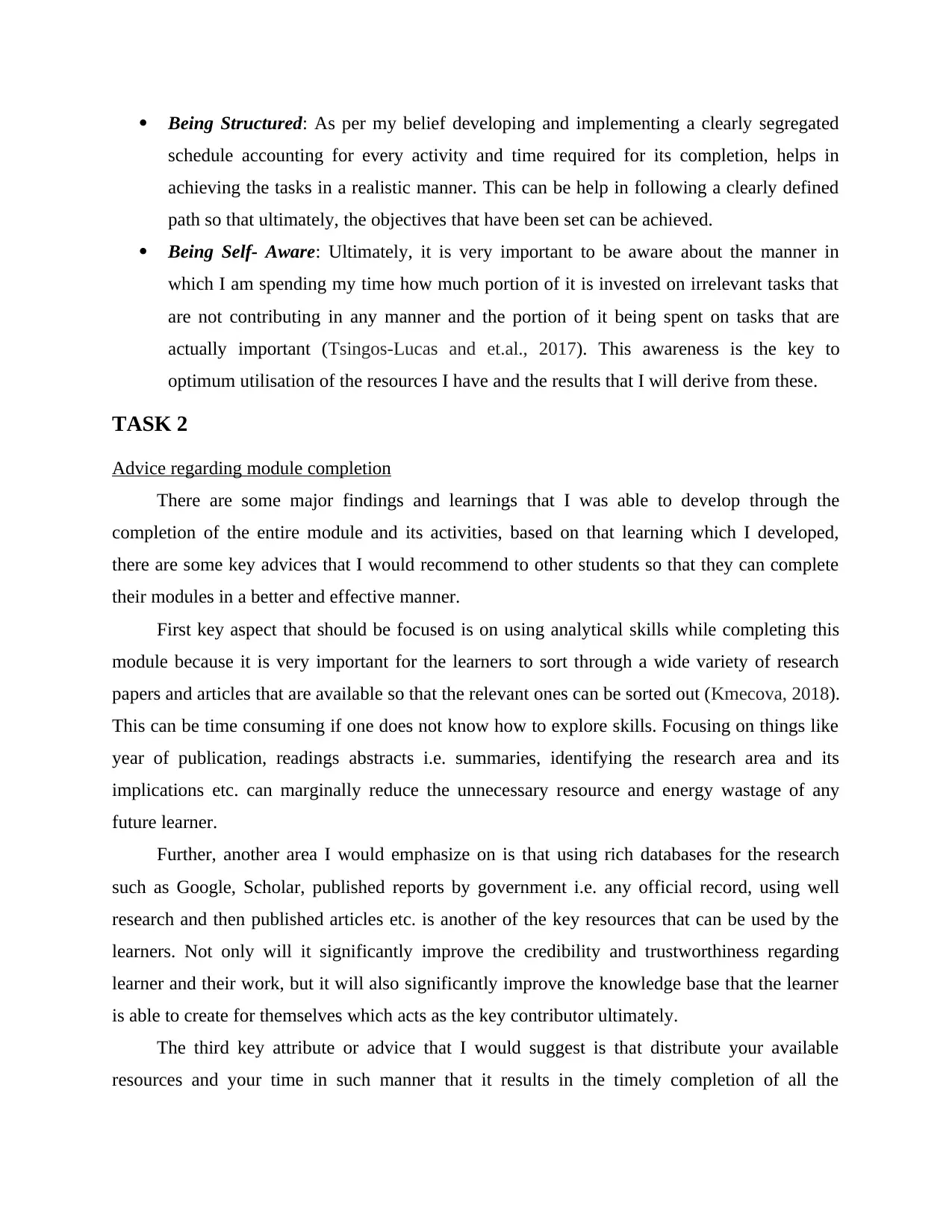
Being Structured: As per my belief developing and implementing a clearly segregated
schedule accounting for every activity and time required for its completion, helps in
achieving the tasks in a realistic manner. This can be help in following a clearly defined
path so that ultimately, the objectives that have been set can be achieved.
Being Self- Aware: Ultimately, it is very important to be aware about the manner in
which I am spending my time how much portion of it is invested on irrelevant tasks that
are not contributing in any manner and the portion of it being spent on tasks that are
actually important (Tsingos-Lucas and et.al., 2017). This awareness is the key to
optimum utilisation of the resources I have and the results that I will derive from these.
TASK 2
Advice regarding module completion
There are some major findings and learnings that I was able to develop through the
completion of the entire module and its activities, based on that learning which I developed,
there are some key advices that I would recommend to other students so that they can complete
their modules in a better and effective manner.
First key aspect that should be focused is on using analytical skills while completing this
module because it is very important for the learners to sort through a wide variety of research
papers and articles that are available so that the relevant ones can be sorted out (Kmecova, 2018).
This can be time consuming if one does not know how to explore skills. Focusing on things like
year of publication, readings abstracts i.e. summaries, identifying the research area and its
implications etc. can marginally reduce the unnecessary resource and energy wastage of any
future learner.
Further, another area I would emphasize on is that using rich databases for the research
such as Google, Scholar, published reports by government i.e. any official record, using well
research and then published articles etc. is another of the key resources that can be used by the
learners. Not only will it significantly improve the credibility and trustworthiness regarding
learner and their work, but it will also significantly improve the knowledge base that the learner
is able to create for themselves which acts as the key contributor ultimately.
The third key attribute or advice that I would suggest is that distribute your available
resources and your time in such manner that it results in the timely completion of all the
schedule accounting for every activity and time required for its completion, helps in
achieving the tasks in a realistic manner. This can be help in following a clearly defined
path so that ultimately, the objectives that have been set can be achieved.
Being Self- Aware: Ultimately, it is very important to be aware about the manner in
which I am spending my time how much portion of it is invested on irrelevant tasks that
are not contributing in any manner and the portion of it being spent on tasks that are
actually important (Tsingos-Lucas and et.al., 2017). This awareness is the key to
optimum utilisation of the resources I have and the results that I will derive from these.
TASK 2
Advice regarding module completion
There are some major findings and learnings that I was able to develop through the
completion of the entire module and its activities, based on that learning which I developed,
there are some key advices that I would recommend to other students so that they can complete
their modules in a better and effective manner.
First key aspect that should be focused is on using analytical skills while completing this
module because it is very important for the learners to sort through a wide variety of research
papers and articles that are available so that the relevant ones can be sorted out (Kmecova, 2018).
This can be time consuming if one does not know how to explore skills. Focusing on things like
year of publication, readings abstracts i.e. summaries, identifying the research area and its
implications etc. can marginally reduce the unnecessary resource and energy wastage of any
future learner.
Further, another area I would emphasize on is that using rich databases for the research
such as Google, Scholar, published reports by government i.e. any official record, using well
research and then published articles etc. is another of the key resources that can be used by the
learners. Not only will it significantly improve the credibility and trustworthiness regarding
learner and their work, but it will also significantly improve the knowledge base that the learner
is able to create for themselves which acts as the key contributor ultimately.
The third key attribute or advice that I would suggest is that distribute your available
resources and your time in such manner that it results in the timely completion of all the
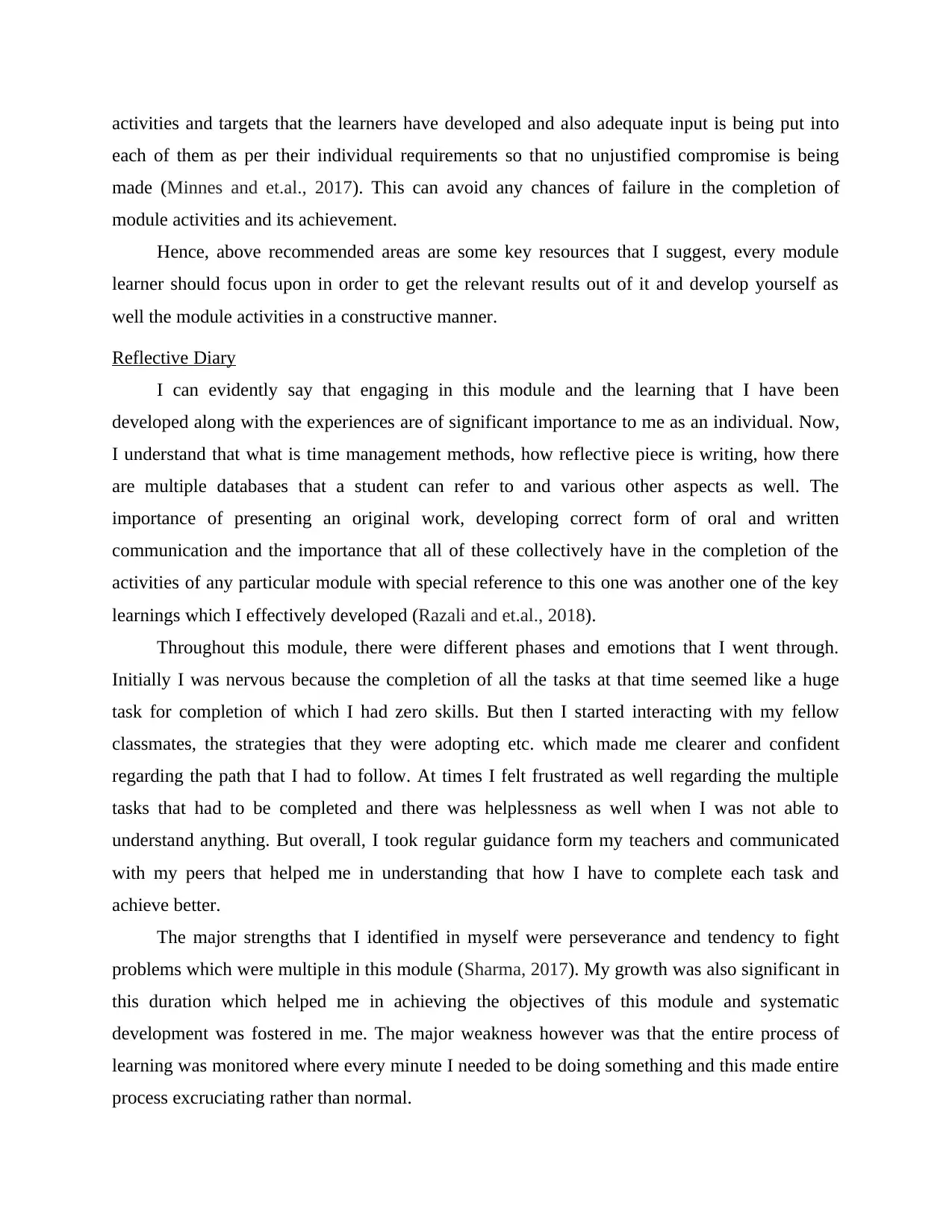
activities and targets that the learners have developed and also adequate input is being put into
each of them as per their individual requirements so that no unjustified compromise is being
made (Minnes and et.al., 2017). This can avoid any chances of failure in the completion of
module activities and its achievement.
Hence, above recommended areas are some key resources that I suggest, every module
learner should focus upon in order to get the relevant results out of it and develop yourself as
well the module activities in a constructive manner.
Reflective Diary
I can evidently say that engaging in this module and the learning that I have been
developed along with the experiences are of significant importance to me as an individual. Now,
I understand that what is time management methods, how reflective piece is writing, how there
are multiple databases that a student can refer to and various other aspects as well. The
importance of presenting an original work, developing correct form of oral and written
communication and the importance that all of these collectively have in the completion of the
activities of any particular module with special reference to this one was another one of the key
learnings which I effectively developed (Razali and et.al., 2018).
Throughout this module, there were different phases and emotions that I went through.
Initially I was nervous because the completion of all the tasks at that time seemed like a huge
task for completion of which I had zero skills. But then I started interacting with my fellow
classmates, the strategies that they were adopting etc. which made me clearer and confident
regarding the path that I had to follow. At times I felt frustrated as well regarding the multiple
tasks that had to be completed and there was helplessness as well when I was not able to
understand anything. But overall, I took regular guidance form my teachers and communicated
with my peers that helped me in understanding that how I have to complete each task and
achieve better.
The major strengths that I identified in myself were perseverance and tendency to fight
problems which were multiple in this module (Sharma, 2017). My growth was also significant in
this duration which helped me in achieving the objectives of this module and systematic
development was fostered in me. The major weakness however was that the entire process of
learning was monitored where every minute I needed to be doing something and this made entire
process excruciating rather than normal.
each of them as per their individual requirements so that no unjustified compromise is being
made (Minnes and et.al., 2017). This can avoid any chances of failure in the completion of
module activities and its achievement.
Hence, above recommended areas are some key resources that I suggest, every module
learner should focus upon in order to get the relevant results out of it and develop yourself as
well the module activities in a constructive manner.
Reflective Diary
I can evidently say that engaging in this module and the learning that I have been
developed along with the experiences are of significant importance to me as an individual. Now,
I understand that what is time management methods, how reflective piece is writing, how there
are multiple databases that a student can refer to and various other aspects as well. The
importance of presenting an original work, developing correct form of oral and written
communication and the importance that all of these collectively have in the completion of the
activities of any particular module with special reference to this one was another one of the key
learnings which I effectively developed (Razali and et.al., 2018).
Throughout this module, there were different phases and emotions that I went through.
Initially I was nervous because the completion of all the tasks at that time seemed like a huge
task for completion of which I had zero skills. But then I started interacting with my fellow
classmates, the strategies that they were adopting etc. which made me clearer and confident
regarding the path that I had to follow. At times I felt frustrated as well regarding the multiple
tasks that had to be completed and there was helplessness as well when I was not able to
understand anything. But overall, I took regular guidance form my teachers and communicated
with my peers that helped me in understanding that how I have to complete each task and
achieve better.
The major strengths that I identified in myself were perseverance and tendency to fight
problems which were multiple in this module (Sharma, 2017). My growth was also significant in
this duration which helped me in achieving the objectives of this module and systematic
development was fostered in me. The major weakness however was that the entire process of
learning was monitored where every minute I needed to be doing something and this made entire
process excruciating rather than normal.
⊘ This is a preview!⊘
Do you want full access?
Subscribe today to unlock all pages.

Trusted by 1+ million students worldwide
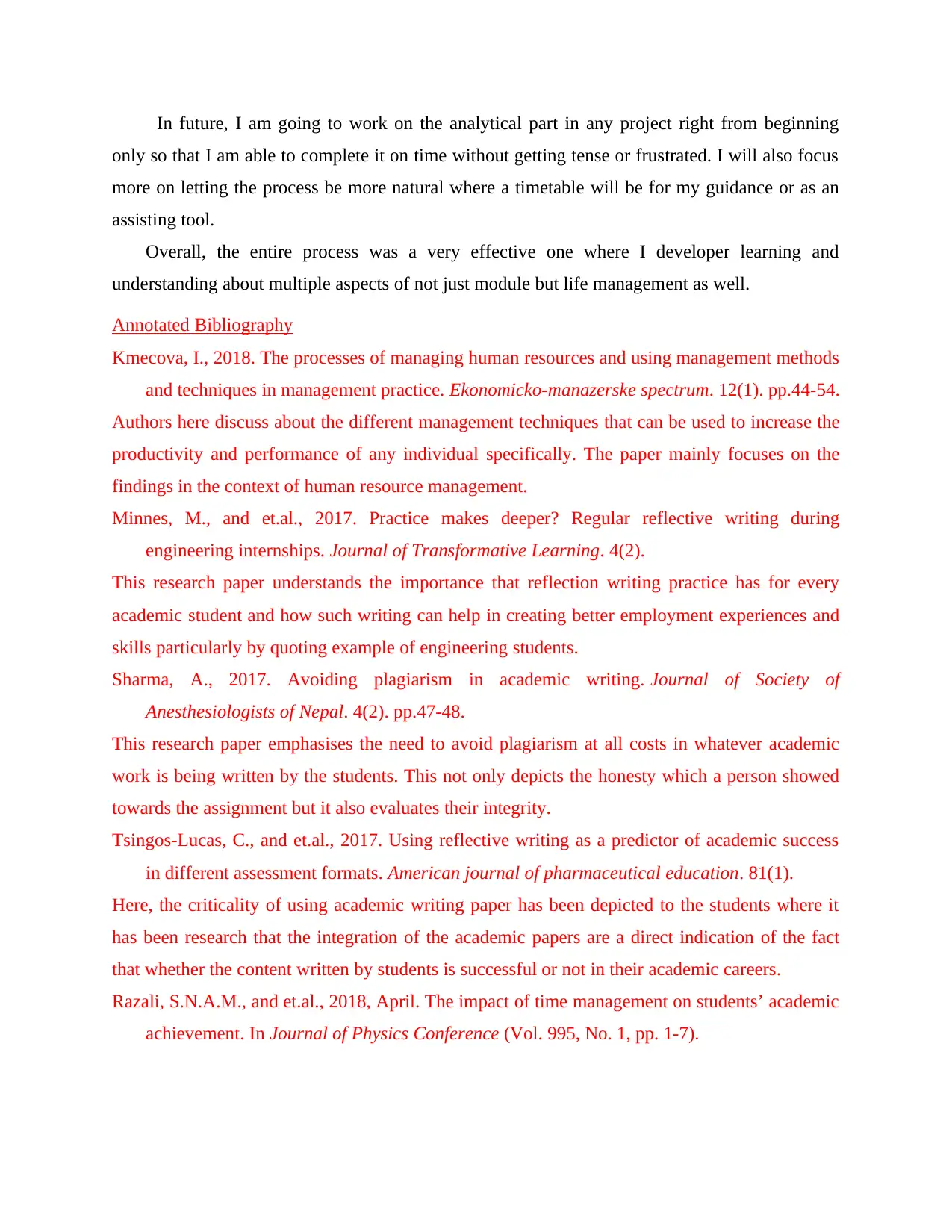
In future, I am going to work on the analytical part in any project right from beginning
only so that I am able to complete it on time without getting tense or frustrated. I will also focus
more on letting the process be more natural where a timetable will be for my guidance or as an
assisting tool.
Overall, the entire process was a very effective one where I developer learning and
understanding about multiple aspects of not just module but life management as well.
Annotated Bibliography
Kmecova, I., 2018. The processes of managing human resources and using management methods
and techniques in management practice. Ekonomicko-manazerske spectrum. 12(1). pp.44-54.
Authors here discuss about the different management techniques that can be used to increase the
productivity and performance of any individual specifically. The paper mainly focuses on the
findings in the context of human resource management.
Minnes, M., and et.al., 2017. Practice makes deeper? Regular reflective writing during
engineering internships. Journal of Transformative Learning. 4(2).
This research paper understands the importance that reflection writing practice has for every
academic student and how such writing can help in creating better employment experiences and
skills particularly by quoting example of engineering students.
Sharma, A., 2017. Avoiding plagiarism in academic writing. Journal of Society of
Anesthesiologists of Nepal. 4(2). pp.47-48.
This research paper emphasises the need to avoid plagiarism at all costs in whatever academic
work is being written by the students. This not only depicts the honesty which a person showed
towards the assignment but it also evaluates their integrity.
Tsingos-Lucas, C., and et.al., 2017. Using reflective writing as a predictor of academic success
in different assessment formats. American journal of pharmaceutical education. 81(1).
Here, the criticality of using academic writing paper has been depicted to the students where it
has been research that the integration of the academic papers are a direct indication of the fact
that whether the content written by students is successful or not in their academic careers.
Razali, S.N.A.M., and et.al., 2018, April. The impact of time management on students’ academic
achievement. In Journal of Physics Conference (Vol. 995, No. 1, pp. 1-7).
only so that I am able to complete it on time without getting tense or frustrated. I will also focus
more on letting the process be more natural where a timetable will be for my guidance or as an
assisting tool.
Overall, the entire process was a very effective one where I developer learning and
understanding about multiple aspects of not just module but life management as well.
Annotated Bibliography
Kmecova, I., 2018. The processes of managing human resources and using management methods
and techniques in management practice. Ekonomicko-manazerske spectrum. 12(1). pp.44-54.
Authors here discuss about the different management techniques that can be used to increase the
productivity and performance of any individual specifically. The paper mainly focuses on the
findings in the context of human resource management.
Minnes, M., and et.al., 2017. Practice makes deeper? Regular reflective writing during
engineering internships. Journal of Transformative Learning. 4(2).
This research paper understands the importance that reflection writing practice has for every
academic student and how such writing can help in creating better employment experiences and
skills particularly by quoting example of engineering students.
Sharma, A., 2017. Avoiding plagiarism in academic writing. Journal of Society of
Anesthesiologists of Nepal. 4(2). pp.47-48.
This research paper emphasises the need to avoid plagiarism at all costs in whatever academic
work is being written by the students. This not only depicts the honesty which a person showed
towards the assignment but it also evaluates their integrity.
Tsingos-Lucas, C., and et.al., 2017. Using reflective writing as a predictor of academic success
in different assessment formats. American journal of pharmaceutical education. 81(1).
Here, the criticality of using academic writing paper has been depicted to the students where it
has been research that the integration of the academic papers are a direct indication of the fact
that whether the content written by students is successful or not in their academic careers.
Razali, S.N.A.M., and et.al., 2018, April. The impact of time management on students’ academic
achievement. In Journal of Physics Conference (Vol. 995, No. 1, pp. 1-7).
Paraphrase This Document
Need a fresh take? Get an instant paraphrase of this document with our AI Paraphraser
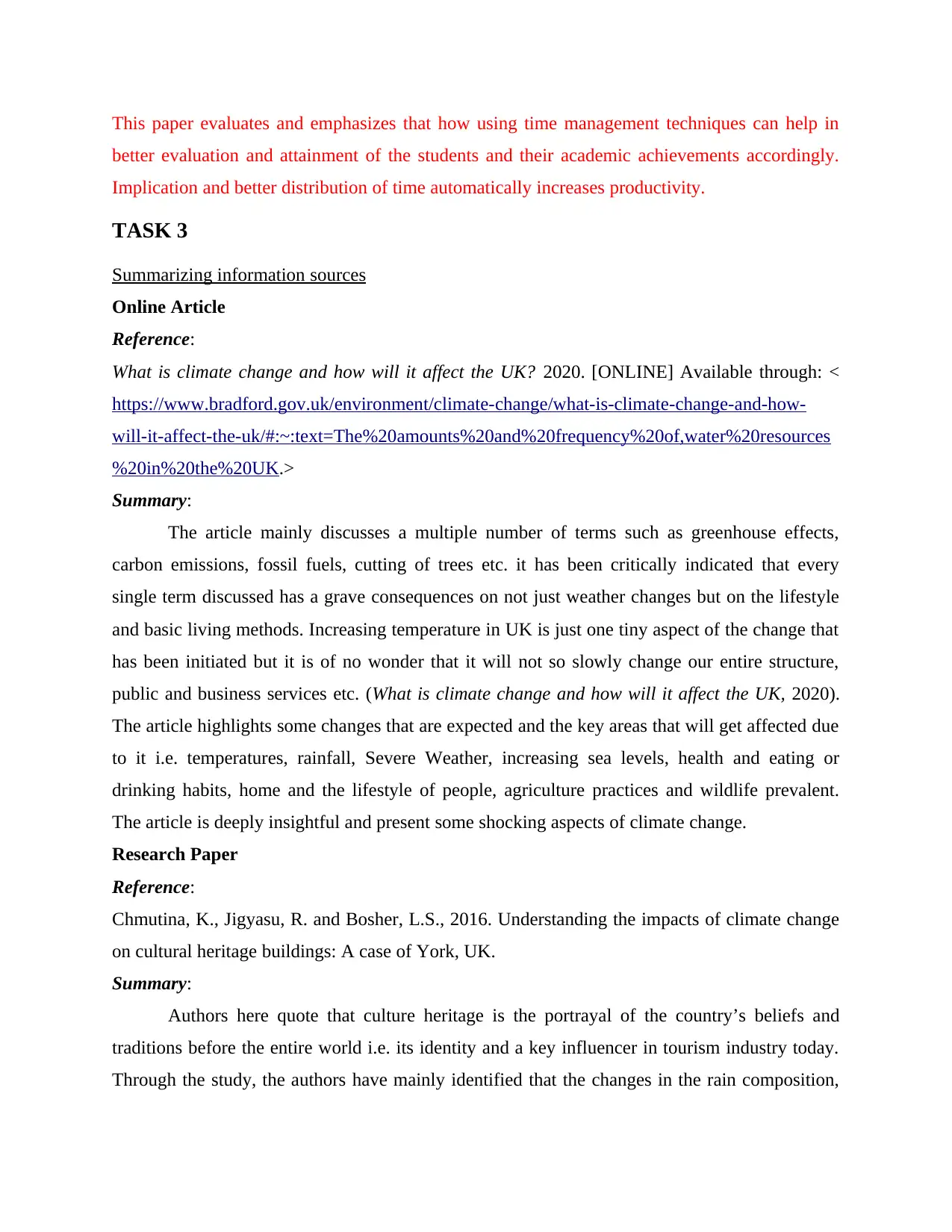
This paper evaluates and emphasizes that how using time management techniques can help in
better evaluation and attainment of the students and their academic achievements accordingly.
Implication and better distribution of time automatically increases productivity.
TASK 3
Summarizing information sources
Online Article
Reference:
What is climate change and how will it affect the UK? 2020. [ONLINE] Available through: <
https://www.bradford.gov.uk/environment/climate-change/what-is-climate-change-and-how-
will-it-affect-the-uk/#:~:text=The%20amounts%20and%20frequency%20of,water%20resources
%20in%20the%20UK.>
Summary:
The article mainly discusses a multiple number of terms such as greenhouse effects,
carbon emissions, fossil fuels, cutting of trees etc. it has been critically indicated that every
single term discussed has a grave consequences on not just weather changes but on the lifestyle
and basic living methods. Increasing temperature in UK is just one tiny aspect of the change that
has been initiated but it is of no wonder that it will not so slowly change our entire structure,
public and business services etc. (What is climate change and how will it affect the UK, 2020).
The article highlights some changes that are expected and the key areas that will get affected due
to it i.e. temperatures, rainfall, Severe Weather, increasing sea levels, health and eating or
drinking habits, home and the lifestyle of people, agriculture practices and wildlife prevalent.
The article is deeply insightful and present some shocking aspects of climate change.
Research Paper
Reference:
Chmutina, K., Jigyasu, R. and Bosher, L.S., 2016. Understanding the impacts of climate change
on cultural heritage buildings: A case of York, UK.
Summary:
Authors here quote that culture heritage is the portrayal of the country’s beliefs and
traditions before the entire world i.e. its identity and a key influencer in tourism industry today.
Through the study, the authors have mainly identified that the changes in the rain composition,
better evaluation and attainment of the students and their academic achievements accordingly.
Implication and better distribution of time automatically increases productivity.
TASK 3
Summarizing information sources
Online Article
Reference:
What is climate change and how will it affect the UK? 2020. [ONLINE] Available through: <
https://www.bradford.gov.uk/environment/climate-change/what-is-climate-change-and-how-
will-it-affect-the-uk/#:~:text=The%20amounts%20and%20frequency%20of,water%20resources
%20in%20the%20UK.>
Summary:
The article mainly discusses a multiple number of terms such as greenhouse effects,
carbon emissions, fossil fuels, cutting of trees etc. it has been critically indicated that every
single term discussed has a grave consequences on not just weather changes but on the lifestyle
and basic living methods. Increasing temperature in UK is just one tiny aspect of the change that
has been initiated but it is of no wonder that it will not so slowly change our entire structure,
public and business services etc. (What is climate change and how will it affect the UK, 2020).
The article highlights some changes that are expected and the key areas that will get affected due
to it i.e. temperatures, rainfall, Severe Weather, increasing sea levels, health and eating or
drinking habits, home and the lifestyle of people, agriculture practices and wildlife prevalent.
The article is deeply insightful and present some shocking aspects of climate change.
Research Paper
Reference:
Chmutina, K., Jigyasu, R. and Bosher, L.S., 2016. Understanding the impacts of climate change
on cultural heritage buildings: A case of York, UK.
Summary:
Authors here quote that culture heritage is the portrayal of the country’s beliefs and
traditions before the entire world i.e. its identity and a key influencer in tourism industry today.
Through the study, the authors have mainly identified that the changes in the rain composition,
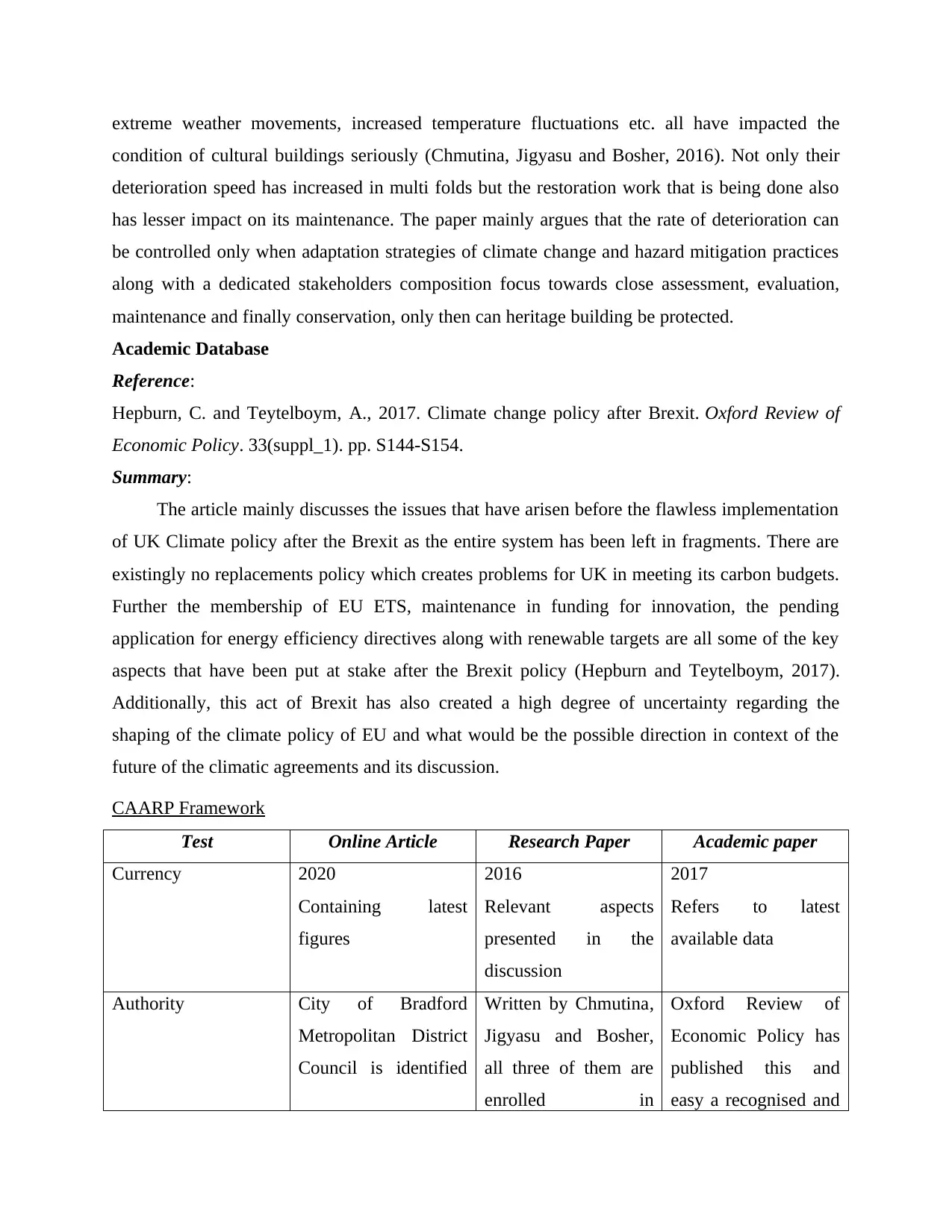
extreme weather movements, increased temperature fluctuations etc. all have impacted the
condition of cultural buildings seriously (Chmutina, Jigyasu and Bosher, 2016). Not only their
deterioration speed has increased in multi folds but the restoration work that is being done also
has lesser impact on its maintenance. The paper mainly argues that the rate of deterioration can
be controlled only when adaptation strategies of climate change and hazard mitigation practices
along with a dedicated stakeholders composition focus towards close assessment, evaluation,
maintenance and finally conservation, only then can heritage building be protected.
Academic Database
Reference:
Hepburn, C. and Teytelboym, A., 2017. Climate change policy after Brexit. Oxford Review of
Economic Policy. 33(suppl_1). pp. S144-S154.
Summary:
The article mainly discusses the issues that have arisen before the flawless implementation
of UK Climate policy after the Brexit as the entire system has been left in fragments. There are
existingly no replacements policy which creates problems for UK in meeting its carbon budgets.
Further the membership of EU ETS, maintenance in funding for innovation, the pending
application for energy efficiency directives along with renewable targets are all some of the key
aspects that have been put at stake after the Brexit policy (Hepburn and Teytelboym, 2017).
Additionally, this act of Brexit has also created a high degree of uncertainty regarding the
shaping of the climate policy of EU and what would be the possible direction in context of the
future of the climatic agreements and its discussion.
CAARP Framework
Test Online Article Research Paper Academic paper
Currency 2020
Containing latest
figures
2016
Relevant aspects
presented in the
discussion
2017
Refers to latest
available data
Authority City of Bradford
Metropolitan District
Council is identified
Written by Chmutina,
Jigyasu and Bosher,
all three of them are
enrolled in
Oxford Review of
Economic Policy has
published this and
easy a recognised and
condition of cultural buildings seriously (Chmutina, Jigyasu and Bosher, 2016). Not only their
deterioration speed has increased in multi folds but the restoration work that is being done also
has lesser impact on its maintenance. The paper mainly argues that the rate of deterioration can
be controlled only when adaptation strategies of climate change and hazard mitigation practices
along with a dedicated stakeholders composition focus towards close assessment, evaluation,
maintenance and finally conservation, only then can heritage building be protected.
Academic Database
Reference:
Hepburn, C. and Teytelboym, A., 2017. Climate change policy after Brexit. Oxford Review of
Economic Policy. 33(suppl_1). pp. S144-S154.
Summary:
The article mainly discusses the issues that have arisen before the flawless implementation
of UK Climate policy after the Brexit as the entire system has been left in fragments. There are
existingly no replacements policy which creates problems for UK in meeting its carbon budgets.
Further the membership of EU ETS, maintenance in funding for innovation, the pending
application for energy efficiency directives along with renewable targets are all some of the key
aspects that have been put at stake after the Brexit policy (Hepburn and Teytelboym, 2017).
Additionally, this act of Brexit has also created a high degree of uncertainty regarding the
shaping of the climate policy of EU and what would be the possible direction in context of the
future of the climatic agreements and its discussion.
CAARP Framework
Test Online Article Research Paper Academic paper
Currency 2020
Containing latest
figures
2016
Relevant aspects
presented in the
discussion
2017
Refers to latest
available data
Authority City of Bradford
Metropolitan District
Council is identified
Written by Chmutina,
Jigyasu and Bosher,
all three of them are
enrolled in
Oxford Review of
Economic Policy has
published this and
easy a recognised and
⊘ This is a preview!⊘
Do you want full access?
Subscribe today to unlock all pages.

Trusted by 1+ million students worldwide
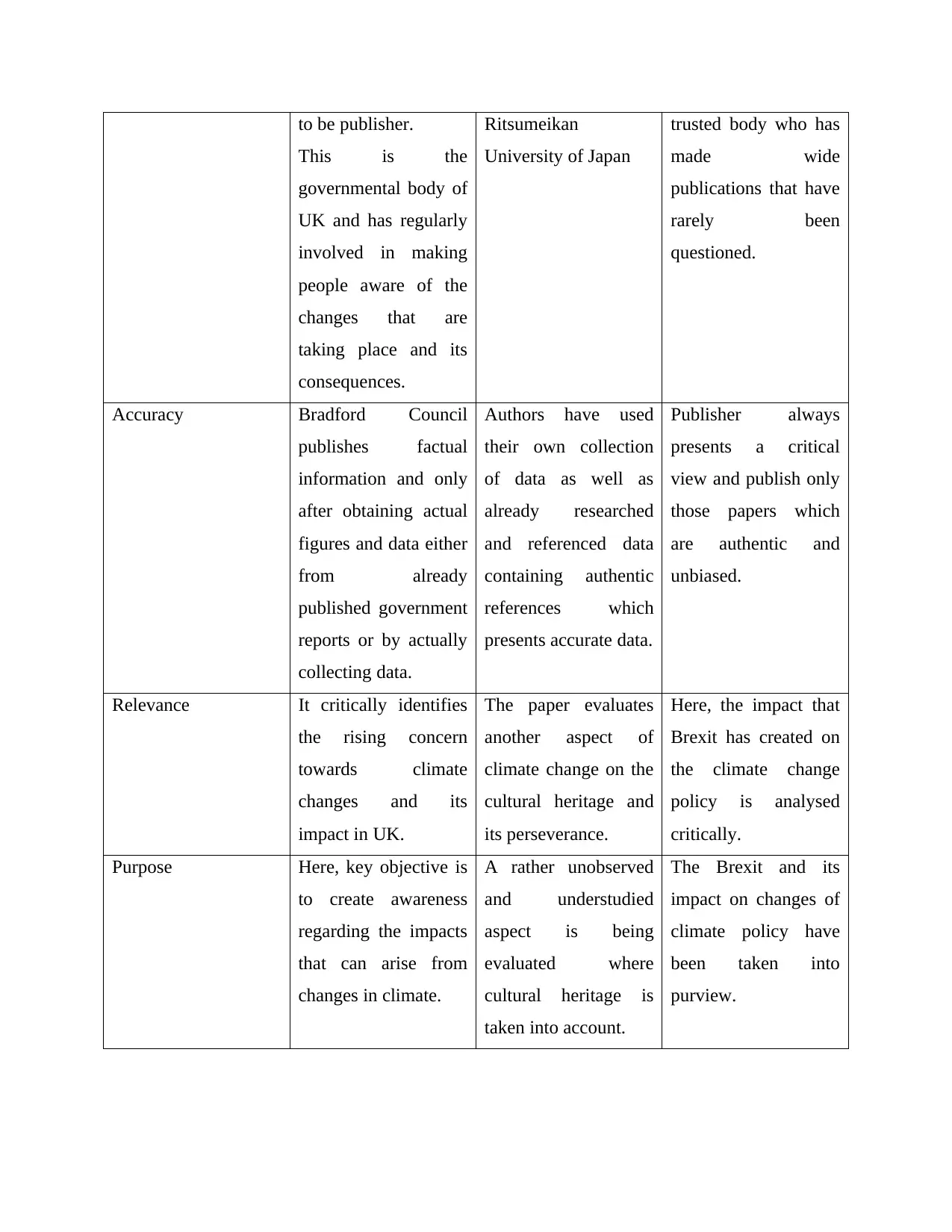
to be publisher.
This is the
governmental body of
UK and has regularly
involved in making
people aware of the
changes that are
taking place and its
consequences.
Ritsumeikan
University of Japan
trusted body who has
made wide
publications that have
rarely been
questioned.
Accuracy Bradford Council
publishes factual
information and only
after obtaining actual
figures and data either
from already
published government
reports or by actually
collecting data.
Authors have used
their own collection
of data as well as
already researched
and referenced data
containing authentic
references which
presents accurate data.
Publisher always
presents a critical
view and publish only
those papers which
are authentic and
unbiased.
Relevance It critically identifies
the rising concern
towards climate
changes and its
impact in UK.
The paper evaluates
another aspect of
climate change on the
cultural heritage and
its perseverance.
Here, the impact that
Brexit has created on
the climate change
policy is analysed
critically.
Purpose Here, key objective is
to create awareness
regarding the impacts
that can arise from
changes in climate.
A rather unobserved
and understudied
aspect is being
evaluated where
cultural heritage is
taken into account.
The Brexit and its
impact on changes of
climate policy have
been taken into
purview.
This is the
governmental body of
UK and has regularly
involved in making
people aware of the
changes that are
taking place and its
consequences.
Ritsumeikan
University of Japan
trusted body who has
made wide
publications that have
rarely been
questioned.
Accuracy Bradford Council
publishes factual
information and only
after obtaining actual
figures and data either
from already
published government
reports or by actually
collecting data.
Authors have used
their own collection
of data as well as
already researched
and referenced data
containing authentic
references which
presents accurate data.
Publisher always
presents a critical
view and publish only
those papers which
are authentic and
unbiased.
Relevance It critically identifies
the rising concern
towards climate
changes and its
impact in UK.
The paper evaluates
another aspect of
climate change on the
cultural heritage and
its perseverance.
Here, the impact that
Brexit has created on
the climate change
policy is analysed
critically.
Purpose Here, key objective is
to create awareness
regarding the impacts
that can arise from
changes in climate.
A rather unobserved
and understudied
aspect is being
evaluated where
cultural heritage is
taken into account.
The Brexit and its
impact on changes of
climate policy have
been taken into
purview.
Paraphrase This Document
Need a fresh take? Get an instant paraphrase of this document with our AI Paraphraser
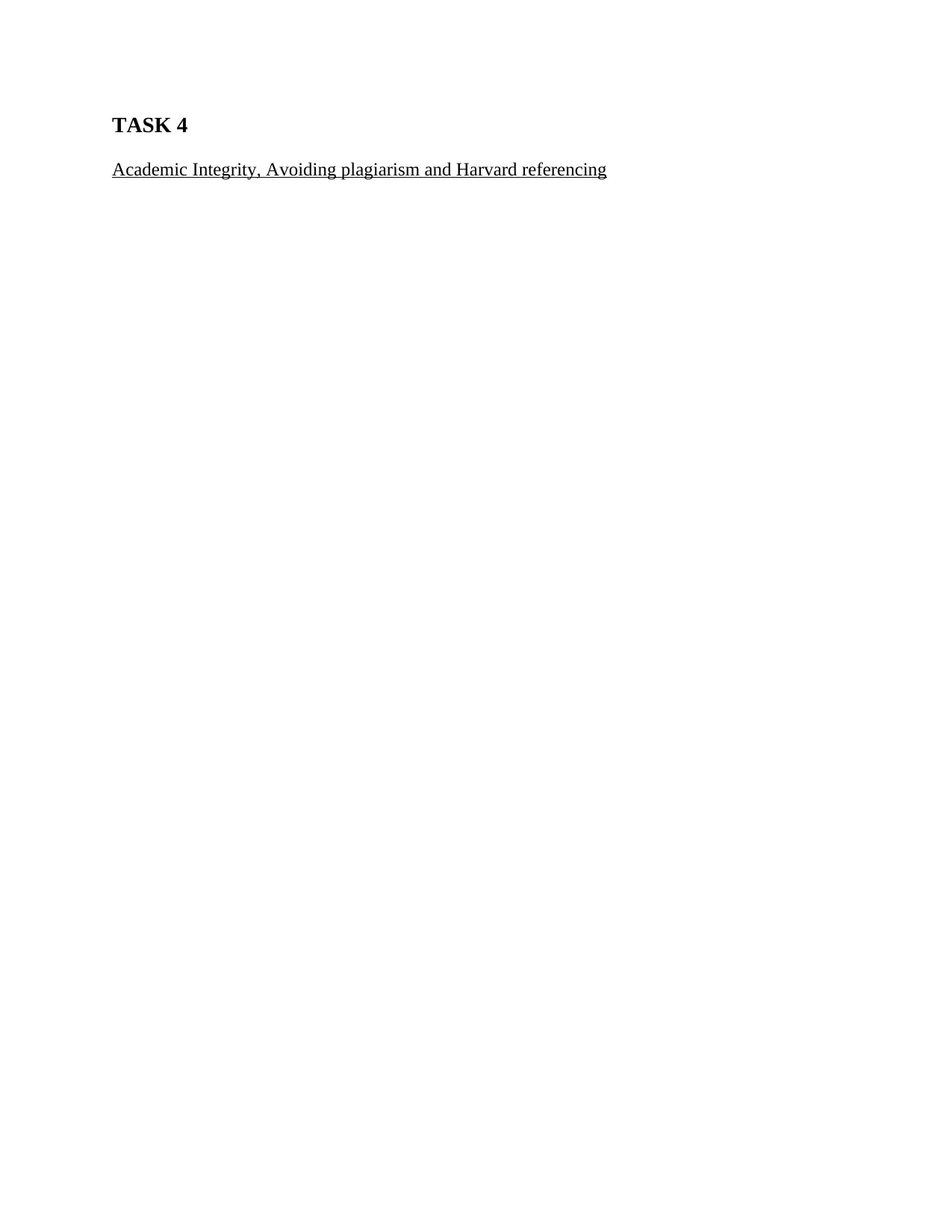
TASK 4
Academic Integrity, Avoiding plagiarism and Harvard referencing
Academic Integrity, Avoiding plagiarism and Harvard referencing
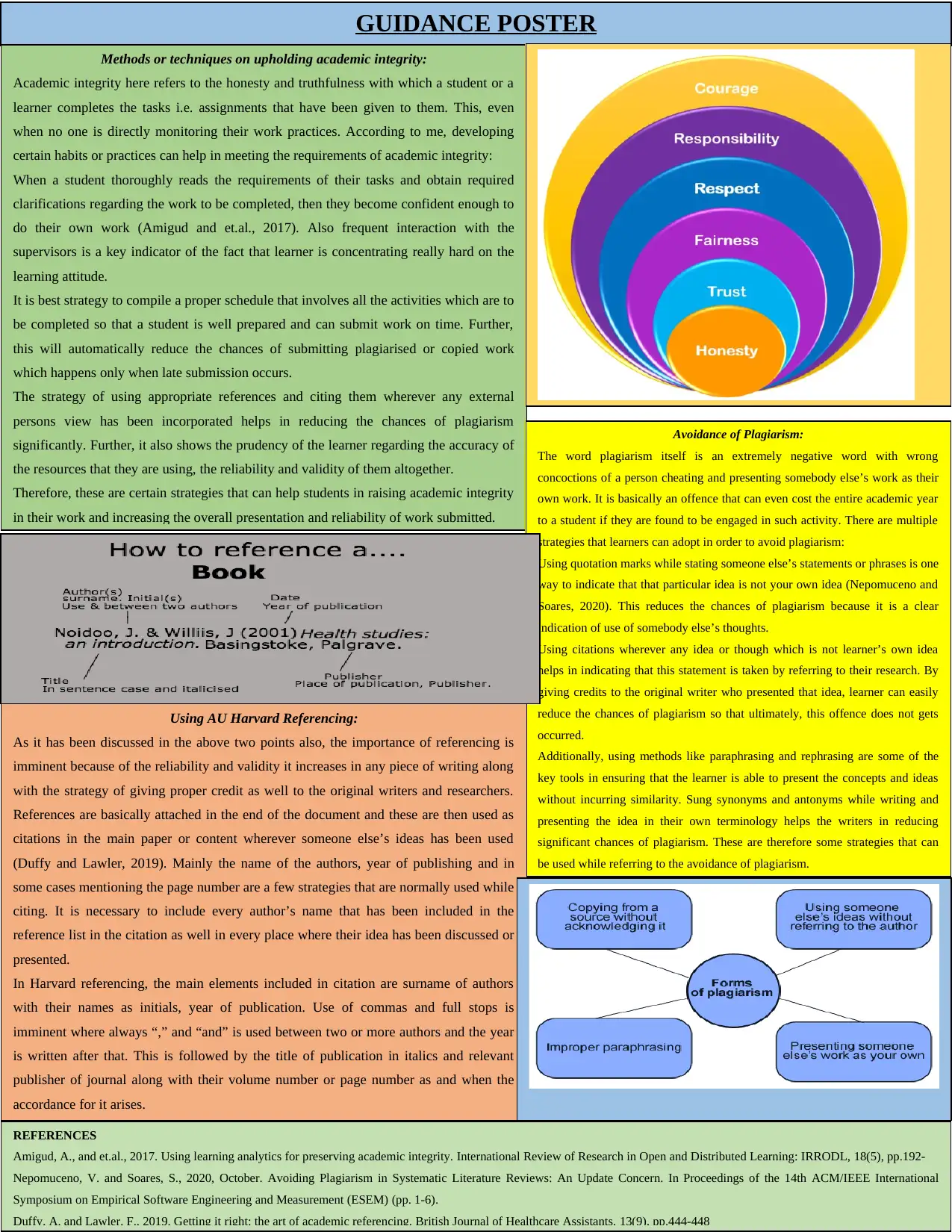
GUIDANCE POSTER
Methods or techniques on upholding academic integrity:
Academic integrity here refers to the honesty and truthfulness with which a student or a
learner completes the tasks i.e. assignments that have been given to them. This, even
when no one is directly monitoring their work practices. According to me, developing
certain habits or practices can help in meeting the requirements of academic integrity:
When a student thoroughly reads the requirements of their tasks and obtain required
clarifications regarding the work to be completed, then they become confident enough to
do their own work (Amigud and et.al., 2017). Also frequent interaction with the
supervisors is a key indicator of the fact that learner is concentrating really hard on the
learning attitude.
It is best strategy to compile a proper schedule that involves all the activities which are to
be completed so that a student is well prepared and can submit work on time. Further,
this will automatically reduce the chances of submitting plagiarised or copied work
which happens only when late submission occurs.
The strategy of using appropriate references and citing them wherever any external
persons view has been incorporated helps in reducing the chances of plagiarism
significantly. Further, it also shows the prudency of the learner regarding the accuracy of
the resources that they are using, the reliability and validity of them altogether.
Therefore, these are certain strategies that can help students in raising academic integrity
in their work and increasing the overall presentation and reliability of work submitted.
Avoidance of Plagiarism:
The word plagiarism itself is an extremely negative word with wrong
concoctions of a person cheating and presenting somebody else’s work as their
own work. It is basically an offence that can even cost the entire academic year
to a student if they are found to be engaged in such activity. There are multiple
strategies that learners can adopt in order to avoid plagiarism:
Using quotation marks while stating someone else’s statements or phrases is one
way to indicate that that particular idea is not your own idea (Nepomuceno and
Soares, 2020). This reduces the chances of plagiarism because it is a clear
indication of use of somebody else’s thoughts.
Using citations wherever any idea or though which is not learner’s own idea
helps in indicating that this statement is taken by referring to their research. By
giving credits to the original writer who presented that idea, learner can easily
reduce the chances of plagiarism so that ultimately, this offence does not gets
occurred.
Additionally, using methods like paraphrasing and rephrasing are some of the
key tools in ensuring that the learner is able to present the concepts and ideas
without incurring similarity. Sung synonyms and antonyms while writing and
presenting the idea in their own terminology helps the writers in reducing
significant chances of plagiarism. These are therefore some strategies that can
be used while referring to the avoidance of plagiarism.
REFERENCES
Amigud, A., and et.al., 2017. Using learning analytics for preserving academic integrity. International Review of Research in Open and Distributed Learning: IRRODL, 18(5), pp.192-
Nepomuceno, V. and Soares, S., 2020, October. Avoiding Plagiarism in Systematic Literature Reviews: An Update Concern. In Proceedings of the 14th ACM/IEEE International
Symposium on Empirical Software Engineering and Measurement (ESEM) (pp. 1-6).
Duffy, A. and Lawler, F., 2019. Getting it right: the art of academic referencing. British Journal of Healthcare Assistants, 13(9), pp.444-448
Using AU Harvard Referencing:
As it has been discussed in the above two points also, the importance of referencing is
imminent because of the reliability and validity it increases in any piece of writing along
with the strategy of giving proper credit as well to the original writers and researchers.
References are basically attached in the end of the document and these are then used as
citations in the main paper or content wherever someone else’s ideas has been used
(Duffy and Lawler, 2019). Mainly the name of the authors, year of publishing and in
some cases mentioning the page number are a few strategies that are normally used while
citing. It is necessary to include every author’s name that has been included in the
reference list in the citation as well in every place where their idea has been discussed or
presented.
In Harvard referencing, the main elements included in citation are surname of authors
with their names as initials, year of publication. Use of commas and full stops is
imminent where always “,” and “and” is used between two or more authors and the year
is written after that. This is followed by the title of publication in italics and relevant
publisher of journal along with their volume number or page number as and when the
accordance for it arises.
Methods or techniques on upholding academic integrity:
Academic integrity here refers to the honesty and truthfulness with which a student or a
learner completes the tasks i.e. assignments that have been given to them. This, even
when no one is directly monitoring their work practices. According to me, developing
certain habits or practices can help in meeting the requirements of academic integrity:
When a student thoroughly reads the requirements of their tasks and obtain required
clarifications regarding the work to be completed, then they become confident enough to
do their own work (Amigud and et.al., 2017). Also frequent interaction with the
supervisors is a key indicator of the fact that learner is concentrating really hard on the
learning attitude.
It is best strategy to compile a proper schedule that involves all the activities which are to
be completed so that a student is well prepared and can submit work on time. Further,
this will automatically reduce the chances of submitting plagiarised or copied work
which happens only when late submission occurs.
The strategy of using appropriate references and citing them wherever any external
persons view has been incorporated helps in reducing the chances of plagiarism
significantly. Further, it also shows the prudency of the learner regarding the accuracy of
the resources that they are using, the reliability and validity of them altogether.
Therefore, these are certain strategies that can help students in raising academic integrity
in their work and increasing the overall presentation and reliability of work submitted.
Avoidance of Plagiarism:
The word plagiarism itself is an extremely negative word with wrong
concoctions of a person cheating and presenting somebody else’s work as their
own work. It is basically an offence that can even cost the entire academic year
to a student if they are found to be engaged in such activity. There are multiple
strategies that learners can adopt in order to avoid plagiarism:
Using quotation marks while stating someone else’s statements or phrases is one
way to indicate that that particular idea is not your own idea (Nepomuceno and
Soares, 2020). This reduces the chances of plagiarism because it is a clear
indication of use of somebody else’s thoughts.
Using citations wherever any idea or though which is not learner’s own idea
helps in indicating that this statement is taken by referring to their research. By
giving credits to the original writer who presented that idea, learner can easily
reduce the chances of plagiarism so that ultimately, this offence does not gets
occurred.
Additionally, using methods like paraphrasing and rephrasing are some of the
key tools in ensuring that the learner is able to present the concepts and ideas
without incurring similarity. Sung synonyms and antonyms while writing and
presenting the idea in their own terminology helps the writers in reducing
significant chances of plagiarism. These are therefore some strategies that can
be used while referring to the avoidance of plagiarism.
REFERENCES
Amigud, A., and et.al., 2017. Using learning analytics for preserving academic integrity. International Review of Research in Open and Distributed Learning: IRRODL, 18(5), pp.192-
Nepomuceno, V. and Soares, S., 2020, October. Avoiding Plagiarism in Systematic Literature Reviews: An Update Concern. In Proceedings of the 14th ACM/IEEE International
Symposium on Empirical Software Engineering and Measurement (ESEM) (pp. 1-6).
Duffy, A. and Lawler, F., 2019. Getting it right: the art of academic referencing. British Journal of Healthcare Assistants, 13(9), pp.444-448
Using AU Harvard Referencing:
As it has been discussed in the above two points also, the importance of referencing is
imminent because of the reliability and validity it increases in any piece of writing along
with the strategy of giving proper credit as well to the original writers and researchers.
References are basically attached in the end of the document and these are then used as
citations in the main paper or content wherever someone else’s ideas has been used
(Duffy and Lawler, 2019). Mainly the name of the authors, year of publishing and in
some cases mentioning the page number are a few strategies that are normally used while
citing. It is necessary to include every author’s name that has been included in the
reference list in the citation as well in every place where their idea has been discussed or
presented.
In Harvard referencing, the main elements included in citation are surname of authors
with their names as initials, year of publication. Use of commas and full stops is
imminent where always “,” and “and” is used between two or more authors and the year
is written after that. This is followed by the title of publication in italics and relevant
publisher of journal along with their volume number or page number as and when the
accordance for it arises.
⊘ This is a preview!⊘
Do you want full access?
Subscribe today to unlock all pages.

Trusted by 1+ million students worldwide
1 out of 14
Related Documents
Your All-in-One AI-Powered Toolkit for Academic Success.
+13062052269
info@desklib.com
Available 24*7 on WhatsApp / Email
![[object Object]](/_next/static/media/star-bottom.7253800d.svg)
Unlock your academic potential
Copyright © 2020–2026 A2Z Services. All Rights Reserved. Developed and managed by ZUCOL.


